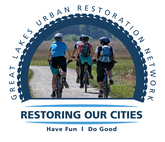Since 2008, Great Lakes Urban has been implementing asset-based community development (ABCD) methodologies in West Michigan. Over the years, we have developed a unique framework for applying ABCD at a neighborhood level. We call our framework CommunityWorks.
The CommunityWorks framework incorporates a four phase, step-by-step process. Field-tested for more than a decade, CommunityWorks has evolved into a proven method for bringing residents together to create a preferred future for their neighborhood and community. The average community will complete the four phases in two to five years, but the completion of the process is really about establishing structured relationships that work to nurture a more vibrant community far into the future.
The CommunityWorks framework incorporates a four phase, step-by-step process. Field-tested for more than a decade, CommunityWorks has evolved into a proven method for bringing residents together to create a preferred future for their neighborhood and community. The average community will complete the four phases in two to five years, but the completion of the process is really about establishing structured relationships that work to nurture a more vibrant community far into the future.
PHASE 1: Anchoring ChangeThe Regional Coach, with support from the City Team, discovers who lives, works, and plays in target neighborhoods. Activities focus on interacting with a diverse mix of people and organizations to help identify what matters most to them. This phase addresses the articulation of neighborhood boundaries, common aspirations, and the formation of Neighborhood Teams.
|
PHASE 2: Mapping ChangeThe Regional Coach, with support from the City Team, discovers who lives, works, and plays in target neighborhoods. Activities focus on interacting with a diverse mix of people and organizations to help identify what matters most to them. This phase addresses the articulation of neighborhood boundaries, common aspirations, and the formation of Neighborhood Teams.
|
PHASE 3: Mobilizing for ChangeThe Neighborhood Team, with the support of the Regional Coach, engages as many people as possible within the neighborhood’s boundaries in decision-making, aiming for broad and meaningful participation and consensus. Residents are mobilized around shared interests and common concerns resulting in activities and actions that are good for all.
|
PHASE 4: Sustaining ChangeThe Neighborhood Team formalizes with a board and officers, develops a stewardship plan, and raises the resources to hire a Neighborhood Connector to continue the work of listening to the residents and connecting local assets. The City Team and Regional Coach can then expand to new areas and support a growing network of Neighborhood Connectors and resident leaders.
|
Four key building blocks, when firmly established, ensure the effective and sustained implementation and replication of the four phases outlined above.
Regional TeamResidents, city leaders, and representatives from the business, civic, nonprofit, education, and other sectors who care about long-term, sustainable approaches to neighborhood strengthening |
Regional Connector
Embedded in independent, regional organizations with a proven track record of developing relationships within their neighborhoods, Regional Coaches develop and support neighborhood leaders and their teams and train and coach Neighborhood Connectors |
Neighborhood TeamResidents and partners that engage as many people as possible in identifying the boundaries of the neighborhood and setting an agenda for change. The team fundraises and recruits a Neighborhood Connector and ensures the ongoing implementation of ABCD |
Neighborhood ConnectorBelieve that their neighbors already have the resources they need to start facilitating change. Their primary function is to listen, engage, connect, and empower neighbors to act on the issues they care about |
Cities that implement the CommunityWorks framework will observe the following dimensions of community life strengthened. A shared vision and sense of community will take root; local ownership and local leadership will grow; the capacity of residents (resources, relationships, knowledge, and skills) will be mobilized for good; all of which will result in concrete improvements in neighborhood conditions and the quality of life for children, residents, and families.
Are you interested in learning more about, or in joining, a network of like-minded ABCD practitioners or trainer-coaches? Contact us!
Are you interested in learning more about, or in joining, a network of like-minded ABCD practitioners or trainer-coaches? Contact us!
